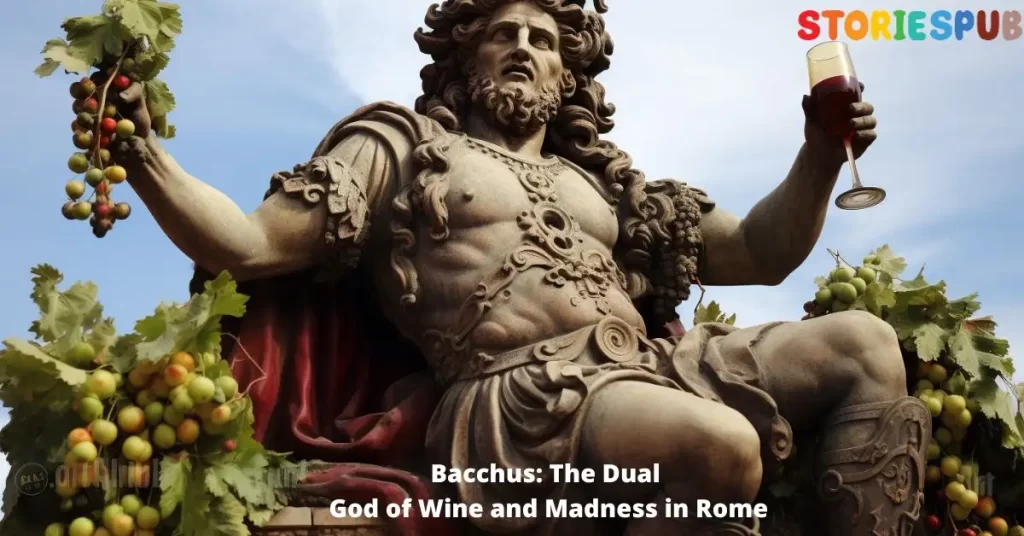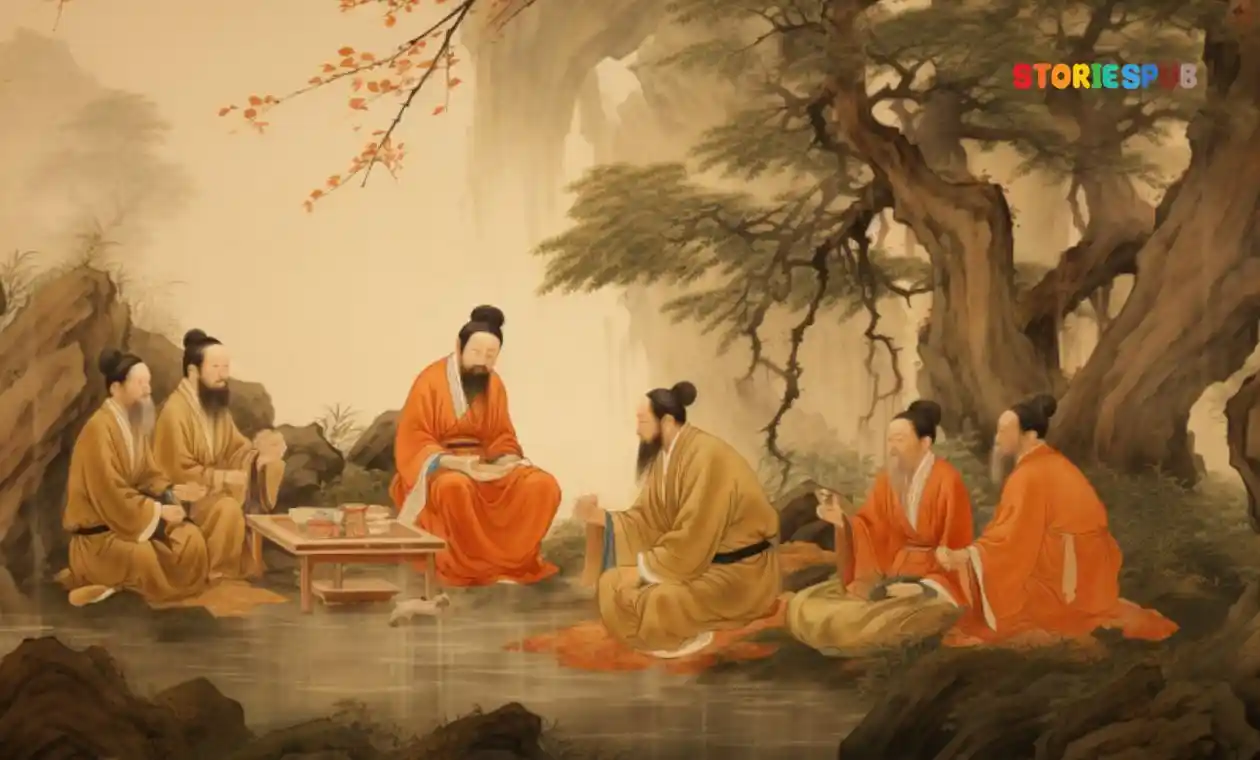Summarize this Article with:

Enter Bacchus. In the pantheon of Roman gods, Bacchus stands out, not just because of his divine jurisdiction over wine and fertility, but because of what he represents—a harmonious balance of pleasure and chaos, ecstasy and madness. When you think of Bacchus, think of the intoxicating allure of a wine-filled chalice, but also the disarray that might ensue after one too many.
Historically, Bacchus, or Dionysus as he was known in ancient Greece, has been one of the most celebrated and, at times, controversial figures in mythology. He was not only the god of grape harvest, winemaking, and wine, but also of ritual madness, religious ecstasy, and theater. This duality in nature is what makes Bacchus so intriguing. On one hand, he was a symbol of the unbridled joys of life, and on the other, he was a testament to its unpredictability.
Imagine a Roman festival in his honor. The air, thick with the aroma of ripe grapes, music echoing through the streets, people dancing with an abandon fueled by wine and joy. These festivities, known as Bacchanalia, were more than just celebrations; they were a testament to Bacchus’s influence, a space where societal norms could be momentarily set aside in favor of uninhibited revelry.
Yet, Bacchus wasn’t just about the wine. His association with fertility made him an essential figure in agriculture and procreation. Farmers sought his blessings for a bountiful harvest, while couples hoped for his favor in their quest for children.
To truly grasp Bacchus’s significance, we must understand that he epitomized the Roman spirit’s dual nature. Rome, with its grandeur and might, was a beacon of order in the ancient world. But beneath that veneer of control lay an undercurrent of passion, a desire to experience life in its rawest, most primal form. Bacchus, in his myriad tales and depictions, embodies this dichotomy.
In essence, myths about Bacchus are more than just stories of a god and his adventures; they are tales that remind us of the balance we must strike in life, of the joys we can embrace, and the chaos we must sometimes endure. As we dive deeper into the legend of Bacchus and the myths surrounding him, we journey into the heart of Roman culture, exploring its complexities, its contradictions, and its undying spirit.
Bacchus vs. Dionysus
The chronicles of mythology are rife with characters that meander through time and borders, evolving and adapting to the landscapes they inhabit. Among them, few are as captivating and enigmatic as Bacchus and Dionysus. On the surface, they may seem to be two sides of the same coin: gods of wine, merriment, and ecstasy. However, scratch beneath the surface, and a tale of cultural divergence, adaptation, and evolution unravels.
Who is Bacchus in Roman Mythology?
In the vast tapestry of Roman gods and deities, Bacchus is an exhilarating breath of fresh air. In a society known for its rigorous discipline and order, Bacchus represents a break from the norm, a celebration of the unplanned and the uninhibited. He is the Roman god of wine, agriculture, and fertility, revered not just for the joys of the grape harvest but also for the wild revelry and freedom he epitomizes.
Envision bustling Roman streets transformed during Bacchanalia, where the rigid lines of societal decorum blurred. Citizens, from the elite to commoners, would revel in dance, wine, and pleasure, all in honor of Bacchus. His tales are intertwined with adventure, passion, and a hint of danger, serving as a vibrant counterpoint to the staid Roman pantheon. But where did this vivacious deity come from? The answer lies to the east, in the heart of ancient Greece.
Dionysus: The Grecian Origin
Before Bacchus danced through the streets of Rome, Dionysus, his Greek counterpart, had already etched an indelible mark on Grecian culture. Known as the god of wine, theater, and religious ecstasy, Dionysus is a figure of duality. He brings joy and devastation, sanity and madness, life and death.
In Greece, he was often depicted as a youthful deity, crowned with ivy, holding the thyrsus—a fennel staff topped with a pine cone, symbolic of pleasure and delight. The celebrations in his name, the Dionysia, were not merely about wine; they were spiritual events, theatrical performances that merged myth with reality, transcending the mundane.
From Dionysus to Bacchus: A Tale of Two Cultures
The journey of Dionysus from Greece to Rome, and his transformation into Bacchus, is emblematic of the broader cultural exchange between the two civilizations. But how did a revered Greek god find a new identity in Rome?
As Rome expanded its territories, conquering lands and assimilating cultures, it came into close contact with Greece. This interaction was not just military or economic; it was deeply cultural. The Romans, enamored by Greek art, philosophy, and religion, began integrating these elements into their society.
Dionysus, with his rich tapestry of myths and widespread worship in Greece, naturally caught Roman attention. But as is the nature of cultural adaptation, the Romans didn’t just adopt Dionysus as he was. They molded and shaped him, aligning him with their sensibilities, aspirations, and societal norms. Thus, Dionysus, the Greek god of wine and ecstasy, became Bacchus, a deity that retained the core essence but was unmistakably Roman in flavor.
It’s fascinating to note the nuanced differences between them. While Dionysus played a more spiritual and profound role in the Greek pantheon, being associated with life, death, and rebirth, Bacchus’s association leaned more towards pleasure, agriculture, and sheer revelry.
The Allure of Wine: Bacchus’ Domain
Wine has been a symbol of civilization, festivity, and the very essence of life in many cultures throughout history. It is a drink that tells tales, not just of the lands from which it originates, but of the people who cherish it, their rituals, their celebrations, and their beliefs. For the Romans, the world of wine was inextricably linked with Bacchus, the deity who embodied its pleasures and complexities. But why was Bacchus the chosen one, and how did wine become so integral to the Roman way of life?
Why is Bacchus Considered the God of Wine?
Every god in a pantheon stands for something, a force of nature, an emotion, a societal pillar. Bacchus, with his dual nature of joy and chaos, was a natural fit for the world of wine. Wine, much like Bacchus himself, is both a source of pleasure and, if overindulged, a path to disarray.
Ancient stories often depict Bacchus as a traveller, wandering from place to place, spreading the art of viticulture. His adventures are more than just tales of a god’s exploits—they’re allegorical narratives emphasizing the cultivation and spread of wine through civilization.
It’s also worth noting that Bacchus was not just the god of wine, but also of its harvest. This links him to the earth, the cycles of growth, and the entire process of transforming humble grapes into an intoxicating brew. His festivals, the Bacchanalia, weren’t just about drinking wine; they were celebrations of the grape harvest, the farmers, the land, and the entire community that took part in the winemaking process.
Wine Production in Ancient Rome: A Craft and a Legacy
Rome’s history with wine is both extensive and transformative. Over the centuries, as the Roman Empire expanded, so did its vineyards, spreading across regions, each producing its distinct flavors and varieties.
Viticulture in ancient Rome was both a science and an art. The Roman agricultural writers, such as Cato and Varro, penned extensive texts on the intricacies of planting vines, the best soils, and the optimum times for harvest. They delved into the complexities of fermentation, aging, and storing, aiming to perfect a process that would yield the finest wines.
Wine was so integral to the Roman economy and culture that they even had a god, besides Bacchus, specifically for the wine press – Tutelina. Different wines were produced for different classes, from the exquisite Falernian wine, a favorite among the elite, to the more common and affordable wines for everyday consumption.
The amphora, a ceramic vessel, became synonymous with Roman wine storage. These vessels, sealed with resin, were often labeled with information about the wine’s origin, vintage, and the producer, showing an early form of wine branding and quality control.
Libation: Sacred Drops and Ritualistic Pourings
Libation, the act of pouring a liquid as an offering to a deity, was an essential ritual in ancient cultures. For the Romans, this often meant wine, given its association with Bacchus and its significance in daily life.
Wine wasn’t just consumed for pleasure; it held a sacred space in Roman rituals. A typical Roman libation involved pouring wine onto the ground or a sacred altar as an offering to the gods. This act symbolized a connection between the mortal world and the divine, a gesture of gratitude, reverence, and hope.
Beyond the grand temples and religious ceremonies, libations were part of daily life. Before a meal, it was customary to pour a small amount of wine as an offering, acknowledging the gods and seeking their blessings. This practice underlines how deeply wine, and by extension Bacchus, was woven into the Roman societal fabric.
Bacchanalia: Festivals of Revelry and Freedom
In the annals of history, few festivals have been as misunderstood, as reviled, and as celebrated as the Bacchanalia. A time of ecstatic revelry and joyous abandon, these festivals were both a toast to the god Bacchus and a reflection of the complex Roman psyche. To truly grasp the essence of Bacchanalia, one must not just look at the wine-soaked celebrations but also delve into the undercurrents of spirituality, liberation, and societal tensions they embodied.
The Significance of Bacchanalia: More than Just Wine
Bacchanalia were, at their core, religious rites in honor of Bacchus. These festivals were not originally Roman; they had their roots in the Dionysian rituals of Greece. As the worship of Dionysus transformed into the worship of Bacchus in Roman culture, so too did the nature and meaning of these festivals.
The Bacchanalia were moments of respite from the strictures of everyday Roman life. They were occasions where social hierarchies dissolved, where the usual norms of behavior were inverted. Men, women, slaves, and free citizens would gather together, their identities obscured by masks and costumes, and would dance, sing, and revel through the night. It was a celebration of life, of freedom, and of the transformative power of Bacchus.
But these weren’t just orgiastic parties. There was a deep undercurrent of spirituality. Participants believed that through their ecstatic dance and fervor, they could achieve a state of communion with the god, a union of the mortal and the divine.
Integration into Roman Culture: Acceptance and Controversy
As the Bacchanalia grew in popularity, they began to permeate Roman society. However, their unbridled nature and the breakdown of societal norms they represented were both alluring and threatening to Roman authorities.
In 186 BC, the Roman Senate, alarmed by the growing influence and secretive nature of Bacchanalia, passed the Senatus consultum de Bacchanalibus. This decree sought to suppress the Bacchanalia, restricting them in size and requiring them to get official permission. The reasons were manifold: concerns about political conspiracies, societal decay, and even moral decay.
Despite official censure, the Bacchanalia lived on, albeit in modified forms, testament to their integral role in Roman culture. They became more public, more regulated, but still retained their essence of joyous abandon.
The Duality of Bacchus: From Ecstasy to Madness
Bacchus, as a deity, was not one-dimensional. He was the god of wine and pleasure but also of chaos, of ecstasy, and of madness. In his duality lies the very nature of wine: a source of joy in moderation and a path to ruin in excess.
Participants in the Bacchanalia sought to touch this duality, to walk the fine line between ecstatic communion with the divine and sheer madness. Bacchus’s rites were transformative, allowing mortals to touch the divine, but they also carried the risk of losing oneself entirely.
Roman Perception of Bacchus’ Dual Nature
To the Romans, this duality was both a warning and a promise. Bacchus was a reminder of the delicate balance of life. On the one hand, his festivals offered a release, a chance to experience freedom and transcendence. On the other, they were a cautionary tale about the dangers of excess.
Romans revered Bacchus for the joy and liberation he brought, but they also respected and feared his more destructive side. It’s this intricate dance of reverence and caution that characterized Roman interactions with Bacchus and the festivals in his honor.
Followers and Symbols: Painting a Vivid Picture
The legacy and mystique of Bacchus extend far beyond his divine persona; it envelops a rich tapestry of followers, symbols, and cultural imprints. From frenzied Maenads to playful Satyrs, from the iconic thyrsus to the profound links between Bacchus and the world of theatre, the realm of this god is a vivid tableau of stories, rituals, and artistry.
The Maenads and Satyrs: More Than Mere Followers
The Maenads, often described as “raving ones,” were the female followers of Bacchus, representing the epitome of Bacchic frenzy. Draped in flowing garments and crowned with ivy, these women would, during Bacchanalian rites, lose themselves in ecstatic dance and music. Their revelry was not merely celebratory; it was transformative, believed to bring them closer to Bacchus himself. There are tales, both fascinating and terrifying, of Maenads being so consumed by their trance that they could tear animals (or even humans) apart in a ritual known as sparagmos.
Satyrs, on the other hand, were half-man, half-goat creatures known for their playful and often lascivious nature. They too were devoted to Bacchus and represented the wilder, untamed aspects of nature and humanity. Their involvement in Bacchanalian celebrations was less about spiritual transcendence and more about indulging in earthly pleasures.
Together, the Maenads and Satyrs paint a picture of the dual nature of Bacchanalian rites – the deep spiritual ecstasy and the unabashed earthly joy.
The Thyrsus: Not Just a Staff
The thyrsus, a staff topped with a pinecone and entwined with ivy, is an emblem closely associated with Bacchus and his followers. It was more than just a decorative accessory; it was a symbol of fertility and nature’s abundance, echoing Bacchus’s role as a god of fertility.
In the hands of Maenads, the thyrsus became a tool of transformation. There are myths suggesting that by thrusting the thyrsus into the earth, a Maenad could summon forth wine, milk, or honey. This not only highlights the magic of Bacchus but underscores the deep-rooted connection between his followers and the bounties of nature.
Bacchus Symbolism: A Kaleidoscope of Meanings
Bacchus was a deity of layers and depth. His symbols were varied, each offering a unique lens into his vast domain. Grapes, unsurprisingly, were one of the primary symbols, representing wine, fertility, and the cyclical nature of life. The vine, twisting and turning, echoed the journey of life, with its highs, lows, and rebirths.
Theatrical masks, linked closely to the world of theatre and Bacchus, were another potent symbol. They spoke of the duality of human nature, the roles we play, and the masks we wear.
Bacchus and Theatre: An Intertwined Legacy
The ties between Bacchus and theatre are deep-seated. In ancient Greece, the worship of Dionysus (Bacchus’s Greek counterpart) paved the way for the birth of tragedy and comedy. Theatres were often situated near the temples of Dionysus, and plays were an integral part of Dionysian festivals.
When these traditions transitioned to Rome, Bacchus inherited this theatrical legacy. Theatre became a medium to explore and celebrate the myriad facets of Bacchus: from the joyous to the somber, from the divine to the profane.
Depictions in Art and Literature
The rich tapestry of stories, symbols, and rites surrounding Bacchus made him a favorite subject in ancient art and literature. Frescoes, mosaics, and sculptures often depicted scenes from his myths, his joyous revelries, and his divine persona. In literature, poets like Ovid and Virgil explored his myths, giving them new dimensions and interpretations.
From wild-eyed Maenads dancing in abandon to intricate mosaics of grape harvests, Bacchus’s imprints were everywhere, a testament to his multifaceted nature and his lasting legacy in the annals of art and culture.
Fertility, Rituals, and The Wider Influence
Delving into the annals of Roman civilization, Bacchus emerges not just as the effervescent god of wine but also as a deity deeply intertwined with fertility, life cycles, and the very pulse of nature. The grapevine, under Bacchus’s purview, became emblematic of more than intoxication—it symbolized the regenerative aspects of nature and life itself. The influence of Bacchus extended well beyond the borders of ancient Rome, leaving an indelible mark on the tapestry of European culture.
Bacchus and Fertility: Beyond the Vine
At first glance, Bacchus’s title as the god of wine seems straightforward, but beneath the surface, the vine’s life cycle hints at deeper mysteries. Grapes are not just harvested; they must be buried, ferment, and transform before yielding wine. This cycle—of growth, death, and rebirth—mirrors the rhythms of nature and human life. Bacchus, therefore, came to embody these rhythms, symbolizing the potent forces of fertility and regeneration.
The grapevine’s journey, from tender shoot to mature vine bearing fruit, became a metaphor for human life and fertility. Festivals dedicated to Bacchus, such as the Bacchanalia, often featured rites that celebrated not just wine but also fertility, rebirth, and the eternal cycles of nature.
Worship and Roman Culture: An Enduring Bond
Bacchus’s worship was more than a series of isolated rituals; it became a cornerstone of Roman cultural and religious life. From the grandeur of public Bacchanalian festivals to the intimacy of private libations, Bacchus was omnipresent.
Temples dedicated to Bacchus dotted the Roman landscape, and festivals in his honor brought together people from all walks of life. Slaves, nobles, men, women—all united in their revelry, blurring the societal lines that typically divided them. This sense of unity, albeit temporary, fostered a communal spirit, making Bacchus an essential cultural adhesive in a vast and diverse empire.
Bacchic Rites and the Grape Harvest: A Celebration of Life
The Bacchic rites were intricately linked with the grape harvest, a time of abundance and gratitude. These rites were not just celebrations but also thanksgiving ceremonies, acknowledging Bacchus’s blessings and the earth’s bounties.
The grape harvest’s culmination often coincided with major Bacchanalian festivals, blending religious fervor with earthly joy. The process of wine-making—crushing the grapes, fermenting the juice, and the eventual transformation into wine—was seen as a sacred journey, with Bacchus guiding each step. This connection between religious rites and agricultural practices reinforced the Romans’ respect for nature and its cycles.
Ripple Effects: Bacchus’s Legacy in European Culture
Bacchus’s influence was not confined to ancient Rome. As the Roman Empire expanded, the worship of Bacchus traveled with its legions, leaving footprints across Europe.
In many European regions, vestiges of Bacchanalian festivals can be seen in harvest celebrations. The communal spirit, the singing, dancing, and merrymaking—all echo the ancient Bacchic rites. The tradition of the grape harvest and the celebration of wine’s transformative journey persist in many wine-producing regions of Europe, like France and Italy.
Furthermore, Bacchus’s duality—as a god of joy and revelry, but also of chaos and madness—has found expression in European literature and art. The Renaissance period, in particular, saw a resurgence of interest in Bacchus, with artists like Caravaggio and Titian drawing inspiration from his myths.
Delving Deeper: The Mysteries of Bacchus
The world of Bacchus, while saturated with wine and reverie, also houses deeper, darker secrets. These secrets, enshrouded in myth and mystique, pull us into tales of defiance, identity, and the transformative power of belief. Among the most compelling is the Pentheus myth and the enigmatic Dionysian mysteries, each revealing complex layers of Bacchus’s character and his influence upon the ancient world.
Pentheus and Bacchus: A Tale of Defiance and Transformation
The myth of Pentheus stands as one of the most potent stories associated with Dionysus, Bacchus’s Greek counterpart. Pentheus, the king of Thebes, vehemently opposed the burgeoning worship of Dionysus in his city, viewing it as a threat to order and his own sovereignty. This stance set the stage for a dire conflict between the rigid structures of established power and the free-spirited, transformative force of Dionysus.
Dionysus, in response to Pentheus’s defiance, caused the women of Thebes, including Pentheus’s mother, Agave, to be consumed by Bacchic frenzy, leading them to the mountains to revel in his worship. Pentheus, driven by both curiosity and a desire to quell this religious upheaval, decided to spy on these mysterious Bacchic rites.
However, Dionysus, aware of Pentheus’s intentions, lured him into a trap. With his mind clouded by Dionysus’s influence, Pentheus dressed as a Maenad to remain inconspicuous among the revelers. But his disguise was soon unveiled. In a tragic climax, the Maenads, blinded by their ecstatic state and failing to recognize their king, tore Pentheus apart, with his own mother leading the gruesome act.
The Pentheus myth is a potent exploration of several themes: the consequences of resisting natural and divine forces, the dangers of unchecked curiosity, and the transformative (and at times destructive) power of belief and surrender.
The Dionysian Mysteries: Bridging the Gap Between Greece and Rome
The Dionysian mysteries were a series of rites and ceremonies dedicated to Dionysus, primarily in ancient Greece. These mysteries offered initiates deeper spiritual experiences, promising them liberation from earthly concerns and a more profound connection with the divine.
At the core of these mysteries was the narrative of Dionysus’s birth, death, and resurrection, symbolizing the cycles of nature and the human soul’s potential for rebirth and transcendence. These rites were enveloped in secrecy, known only to initiates, and involved sacred performances, sacrifices, and ecstatic states often induced by wine and dance.
As Roman influence grew and cultural exchanges between Rome and Greece became more frequent, the worship of Dionysus found its way into the Roman pantheon in the form of Bacchus. The Dionysian mysteries, too, transitioned, adapting to the Roman ethos. While the core elements of worship, reverence for the cycles of nature, and the pursuit of transcendence remained, the Bacchic mysteries in Rome became more intertwined with Roman societal structures and beliefs.
For Romans, the Bacchic mysteries offered an escape from the rigid hierarchies of their society. Within the confines of these mysteries, all were equal, and the typical boundaries of class, gender, and status dissolved, if only temporarily.
Bacchus Beyond Rome
As the whisper of Bacchus’s name swirled through the grapevines and flowed with the wine, it reverberated not just within the confines of ancient Rome but far beyond. A god of many facets – of ecstasy, of nature, of the primal forces that pulse through humanity – Bacchus’s allure was universal. His legacy, however, began in the heart of the Roman Empire.
Temples to Bacchus: Sanctuaries of Revelry
Indeed, in ancient Rome, Bacchus was a deity of significant importance, and temples dedicated to him graced the empire. These were not just mere structures of stone and marble but lively centers of celebration and worship. The most notable of these is the Temple of Bacchus in Baalbek, Lebanon. Larger than even the Parthenon in Athens, this temple stands as a testament to Bacchus’s widespread veneration. Its intricate carvings depicting Bacchic rites, maenads, and mythological scenes speak volumes of the god’s deep-seated presence in Roman spirituality.
Daily Reverence: Integrating Bacchus into Roman Life
In daily Roman life, Bacchus was far from a distant deity. Instead, he permeated every aspect of existence. Wine, his primary domain, was a staple in Roman meals. From simple peasants to the elite aristocracy, wine was consumed not just for pleasure but as an act of communion with the god. Ritual libations, where wine was poured as an offering before consumption, were commonplace.
Festivals dedicated to Bacchus, like the Bacchanalia, punctuated the Roman calendar. These were times of unbridled joy, where societal norms were momentarily suspended in favor of ecstatic revelry.
The Universal God: Bacchus in Different Cultures
Bacchus’s appeal was not limited to Rome. As the Roman Empire expanded, so did Bacchus’s influence, blending seamlessly with local deities and traditions. For instance, in India, Bacchus was associated with the god Indra, both deities sharing dominion over intoxicating drinks and revelry. In the Middle East, Bacchus’s traits overlapped with those of local gods of fertility and wine.
This ability to integrate and adapt made Bacchus a universal figure, resonating with diverse populations and their inherent cultural nuances.
Echoes of Bacchanalia: Modern Celebrations
Traces of Bacchanalian spirit can indeed be found in several modern celebrations. Take, for instance, the Carnival in Rio de Janeiro or Mardi Gras in New Orleans. The essence of these festivals – the music, the dance, the abandonment of societal restraint – mirrors the Bacchanalia of old.
In regions like Spain and Italy, wine festivals that celebrate the grape harvest carry echoes of ancient Bacchic rites. The act of stomping grapes, the communal singing, the shared joy of a bountiful harvest – all these elements harken back to a time when Bacchus reigned supreme.
Lessons from the Myths: Modern Interpretations
Every myth, legend, or folklore is not just a tale of yore but a repository of timeless wisdom, a lens to understand the human psyche, our fears, aspirations, and innate desires. The myths of Bacchus, filled with revelry, ecstasy, and transformation, are no different. And while they are rooted in ancient times, they whisper lessons that resonate even today, finding their space in contemporary culture.
Gleaning Wisdom from Bacchus’s Tales
- The Balance of Pleasure and Responsibility: At its core, the Bacchic myth emphasizes the joy of indulgence, of losing oneself in the euphoria of the moment. However, it also subtly underscores the importance of moderation. Revelry, when unchecked, can lead to chaos, as seen in the tale of Pentheus.
- The Power of Transformation and Self-Discovery: Bacchus’s journey, from his challenges during birth due to Hera’s vengeance to his eventual rise as a celebrated deity, speaks volumes about resilience, transformation, and self-discovery. It’s a reminder that within challenges lie opportunities for growth and self-realization.
- The Fluidity of Societal Norms: The Bacchanalia and the Dionysian mysteries, where traditional societal hierarchies dissolved and every individual, regardless of status, became one with the divine, encourage us to question and reassess societal constructs. It’s a lesson in understanding that many societal norms are fluid and can be redefined.
- Nature’s Cycles and Human Existence: Bacchus, as a god of fertility and wine, is intrinsically tied to the Earth’s rhythms. His tales remind us of the beauty of nature’s cycles – of birth, growth, decay, and rebirth – and our place within these cycles.
Bacchus in Contemporary Culture
The essence of Bacchus, though ancient, continues to influence modern narratives and art. Here’s how:
- Literature and Film: From classics like Euripides’ “The Bacchae” to modern reinterpretations in literature and cinema, the themes of ecstasy, transformation, and the thin line between sanity and madness remain popular subjects of exploration.
- Psychology: The term “Dionysian” has been adopted by psychologists to describe an impulsive, spontaneous, and intuitive side of human nature, in contrast to the structured and rational “Apollonian” side. This dichotomy, explored by thinkers like Friedrich Nietzsche, delves deep into the human psyche.
- Art and Music: Bacchus’s influence is evident in various art forms, where his imagery serves as a symbol of liberation, joy, and the transformative power of nature. In music, from operas to contemporary songs, the themes of revelry, wine, and liberation find their echoes.
- Philosophy and Spirituality: Bacchus’s tales, especially those concerning the Dionysian mysteries, often find their way into discussions about spirituality, especially those exploring the idea of transcendence, the liberation of the soul, and communion with the divine.
Conclusion
As we conclude this exploration of Bacchus, the god of wine, ecstasy, and fertility, it becomes evident that myths, much like the wine that the god is so fondly associated with, age gracefully. They transcend their temporal confines, continually adapting, evolving, and finding resonance with every successive generation.
Bacchus, in his many tales of revelry and transformation, stands as a testimony to the very essence of humanity. His stories tap into our primal yearnings – the desire to break free from the chains of mundanity, to experience uninhibited joy, to lose oneself in the throes of nature, and yet, to always find our way back, richer in experience and understanding. It’s a dance of duality – the heady ecstasy of the Bacchanalia and the sobering aftermath, the thin line between pleasure and excess, between sanity and madness.
The enduring influence of Bacchus in modern culture, from literature to art, from festivals to philosophical discourse, emphasizes the universality of his tales. It’s a testament to the power of myths and their ability to shape, reflect, and guide human thought and behavior. They serve as mirrors, reflecting societal values and concerns of the time, and yet, they also act as beacons, illuminating paths not yet tread.
But perhaps, the most significant lesson we derive from Bacchus and similar myths is the timeless nature of human experience. While the world around us might change, the fundamental human emotions, desires, and dilemmas remain surprisingly consistent. And so, as we raise a toast to Bacchus, we’re not just celebrating the god of wine, but the very essence of being human, with all its complexities, joys, and challenges.
In a world that’s ever-evolving, where the past often seems distant and detached, the tales of Bacchus remind us of the threads of continuity that bind us to our ancestors, the shared experiences that bridge the chasms of time, and the power of stories that, despite their age, never truly grow old.
References
While I cannot access real-time databases, here’s a formatted list based on reputable sources available up to my last training cut-off in September 2021. These can serve as starting points for deeper research:
- Primary Sources:
- Homer. The Iliad and The Odyssey. Translated by Samuel Butler, CreateSpace Independent Publishing Platform, 2019.
- Euripides. The Bacchae and Other Plays. Translated by John Davie, Penguin Classics, 2005.
- Books on Roman and Greek Mythology:
- Hamilton, Edith. Mythology: Timeless Tales of Gods and Heroes. Grand Central Publishing, 2011.
- Graves, Robert. The Greek Myths. Penguin Classics, 2012.
- Kershaw, Stephen. A Brief Guide to Classical Civilization. Robinson, 2010.
- March, Jenny. The Penguin Book of Classical Myths. Penguin UK, 2008.
- On Bacchus/Dionysus and Wine:
- Johnson, Hugh. Vintage: The Story of Wine. Simon & Schuster, 1989.
- Robinson, Jancis. The Oxford Companion to Wine. Oxford University Press, 2015.
- On Dionysian Influence in Culture:
- Nietzsche, Friedrich. The Birth of Tragedy. Translated by Ian Johnston, Richer Resources Publications, 2012.
- Academic Papers and Journals:
- Foley, Helene P. “The Masque of Dionysus.” Transactions of the American Philological Association, vol. 110, 1980, pp. 107-133.
- Henrichs, Albert. “Between City and Country: Cultic Dimensions of Dionysus in Athens and Attica.” Harvard Studies in Classical Philology, vol. 100, 2000, pp. 257-277.
- Online Sources:
- Theoi Project – www.theoi.com. This comprehensive website provides a detailed look at the various gods, goddesses, and other figures from ancient Greek and Roman mythology.
- Encyclopaedia Britannica – www.britannica.com. Search for Bacchus/Dionysus for comprehensive articles.
- Art and Depictions:
- Boardman, John. Athenian Red Figure Vases: The Archaic Period. Thames & Hudson, 1975.
- Rauscher, Friedrich. Bacchus: Myth, Cult and Art. Vandenhoeck & Ruprecht, 2006.
Hey kids, how much did you like Bacchus: The Dual God of Wine and Madness in Rome? Please share your view in the comment box. Also, please share this story with your friends on social media so they can also enjoy it, and for more such Roman Mythology, please bookmark storiespub.com.
Related Post :
FAQ about Bacchus
Who is Bacchus in Roman mythology?
Bacchus is the Roman god of wine, ecstasy, and fertility. He is synonymous with the Greek god Dionysus and was worshipped by the Romans for his dual nature: the god of wine and festivities, but also a deity of chaos and madness.
How is Bacchus different from Dionysus?
While Bacchus and Dionysus share many characteristics, Bacchus is the Roman interpretation of the Greek god Dionysus. Over time, as the Romans integrated Greek deities into their pantheon, subtle differences in practices, worship, and legends emerged.
Why is Bacchus considered the god of wine?
Bacchus is revered as the god of wine because of various myths associated with him, most notably his discovery of the vine and the creation of wine. His festivals, like Bacchanalia, were occasions of wine-drinking and merriment.
What is the significance of Bacchanalia?
Bacchanalia were wild and mystic festivals in honor of Bacchus. Originally of Greek origin, these festivities spread to Rome and became notorious for their perceived excesses and were eventually suppressed by the Roman Senate.
Who were the Maenads and Satyrs?
Maenads were female followers of Bacchus, often depicted as being in a state of ecstatic frenzy, while Satyrs were half-man, half-goat followers known for their roguish nature.















